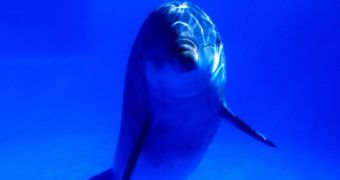News from Japan says that, of the over 250 bottlenose dolphins herded in the Taiji cove last week, 51 have been taken captive. 2 of these marine mammals have already died, and the ones that have not been selected to be sold to marine parks and other similar facilities are to be butchered for their meat.
According to a blogpost published on Sea Shepherd's website, the slaughter of the roughly 200 dolphins swimming in the Taiji cove was scheduled to take place this past January 20.
The organization says that, prior to killing these dolphins, fishermen in Taiji kept them for several days trapped in the cove, and did not provide them with any food or shelter.
Besides, the marine mammals were forced to witness how dozens of them were separated from their families and taken in captivity.
“Five separate pods of Bottlenose dolphins totaling more than 250 individuals including juveniles and babies were driven into Taiji’s infamous killing cove on Thursday, where they have endured four days of a bloody and traumatizing captive selection process.”
“The remaining group of about 200 dolphins, who were left to survive a fourth night in the cove without food or shelter, now face brutal slaughter at the hands of the Taiji Fishermen’s Union,” the organization writes on its website.
As reported just yesterday, a rare albino dolphin calf was among the first marine mammals that were separated from their families.
Sea Shepherd says that the animal is now kept at the Taiji Whale Museum, and claims that, after being parted from it, its mother committed suicide.
“There is widespread speculation that the mother of the albino calf committed suicide after her baby was violently taken from her,” Sea Shepherd says.
“Our volunteer Cove Guardians documented and witnessed the grieving mother repeatedly spy-hopping, looking for her calf, before lowering herself into the water, never to resurface,” it adds.
The organization also says that, of the 200 dolphins that await slaughter, some might be allowed to return to their home in the ocean.
However, these specimens are likely to be young ones that fishermen only reject because they are too small to be of any interest to them, and which cannot possibly survive in the wild without having their families or their pod nearby.
The organization has promised to keep the public informed with respect to the fate of these 200 dolphins, so stay tuned for more news.

 14 DAY TRIAL //
14 DAY TRIAL //